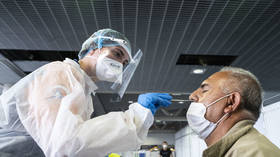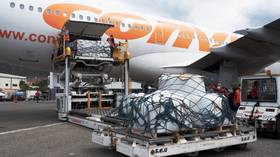No more anal probes? Non-invasive skin swabs are enough to quickly detect Covid-19, new study finds

In a breakthrough that will be welcomed across the globe, University of Surrey researchers claim to have developed a highly accurate Covid-19 test using non-invasive skin swab samples.
Much of the world population who have undergone Covid-19 tests have likely experienced the rather unpleasant polymerase chain reaction (PCR) test, which, as many recipients attest, feels like the equivalent to having your brains scrambled like an egg or ‘stabbed’ given how far back in the throat and down the nose the swab must go. No penetration of the brain occurs in reality, however.
Authorities in China took things a few steps further and anally swabbed over one million Beijing residents for the more infectious UK variant of the coronavirus, insisting that the highly invasive method was more accurate than PCR tests.
Also on rt.com Think it couldn’t get any worse? China rolls out ‘more accurate’ ANAL SWABS for Covid-19 testing (VIDEO)In a new paper published by The Lancet’s E Clinical Medicine, the researchers took sebum samples from 67 hospitalized patients, 30 of whom had tested positive for Covid-19 and 37 who had tested negative.
Sebum is the fatty, oily, waxy substance produced by the body's sebaceous glands in areas such as the face, neck or back. Too little can cause dry, cracked skin while too much can cause various forms of acne.
The sebum samples were subjected to analysis via liquid chromatography-mass spectrometry. The results were then combined with a statistical modeling technique called Partial Least Squares to differentiate Covid-positive and -negative patient samples.
The University of Surrey researchers quickly found that Covid-positive patients had lower lipid levels than their Covid-negative counterparts.
“Our study suggests that we may be able to use non-invasive means to test for diseases such as Covid-19 in the future – a development which I am sure will be welcomed by all," says Dr. Melanie Bailey, co-author of the study, adding that the high likelihood of future pandemics necessitates the development of faster, more accurate yet less invasive testing capabilities.
Damage to skin lipids may now be added to the ever-growing list of injuries inflicted by Covid-19 on human metabolism, but at least the news provides some relief for humanity’s noses and throats.
Like this story? Share it with a friend!













